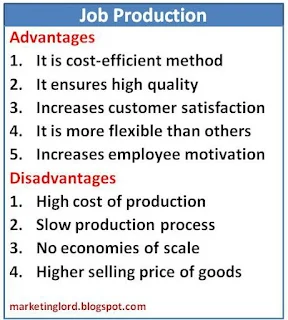Introduction
Job production (also known as jobbing) is a type of manufacturing system in which a firm produces customized products in small volume to fulfill the requirements of customers. In this production system, small batches of non-standardized goods are manufactured as per customers' specification. It requires highly skilled and experienced employees to perform the production activities. Making jewelry items, wedding cake, making furniture, hairdressing, plumbing etc. are the examples of job production.
Advantages Of Job Production
The main advantages of job production system are as follows:
1. Small Investment
Job production does not require huge machines and plant and large volume of raw materials like in continuous or mass manufacturing. Therefore, it is cost-effective than other forms of production methods.
2. Flexible System
It is more flexible than other production systems. Products can be designed or customized as per the interest and needs of the customers.
3. Higher Quality
Another advantage of jobbing is that it ensures higher quality of output. Because of small quantity of items, skilled workers, better materials and proper control it improves the quality of finished products.
4. Customer Satisfaction
It offers high quality goods that fulfill the exact needs of the customers. Therefore, it helps to increases customer satisfaction that helps to build customer loyalty.
5. Employee Motivation
Higher employee motivation is another benefit of job production. Because of less work burden and varied work they fell less boredom and monotonous than continuous production. So, employees feel motivated that leads to increase the job satisfaction.
6. Increased Profit
Because of high quality, a firm may charge premium price to its products and services. Customers also pay higher price for those products which satisfy their needs and expectation. So, it helps to increase the profit of the firm.
Disadvantages Of Job Production
The main disadvantages of job production can be described as below:
1. Lack Of Flexibility
This system is designed for the production of small quantity of goods or services as per the customers' requirement. It becomes difficult to increase production capacity if the demand of the product increases. So, it is inflexible type of manufacturing method.
2. High Cost Of Production
In job production, less quantity of products are manufactured at once. It requires skilled employees and specialization to make high quality products. So, it increases the cost of production.
3. No Economies Of Scale
Because of higher cost and limited volume of production, it does not create economies of scale.
Also Read
Advantages and disadvantages of mass production
Advantages and disadvantages of continuous production
4. Slow Production Process
Another limitation of job production is that it consumes more time to produce goods than other methods of production. Different tools, skilled workers , quality materials and longer time is needed to make high quality unique products.
Pros And Cons Of Job Production In Short
Pros
* Ensure high quality of output
* It increases customers satisfaction and loyalty
* Improves employee morale and job satisfaction
* Consumes less cost and resources than mass production
* It is very easy to organize
Cons
* It is less efficient than other manufacturing methods
* Cost of production is very high
* It is less flexible
* Selling price becomes high because of high cost of production







